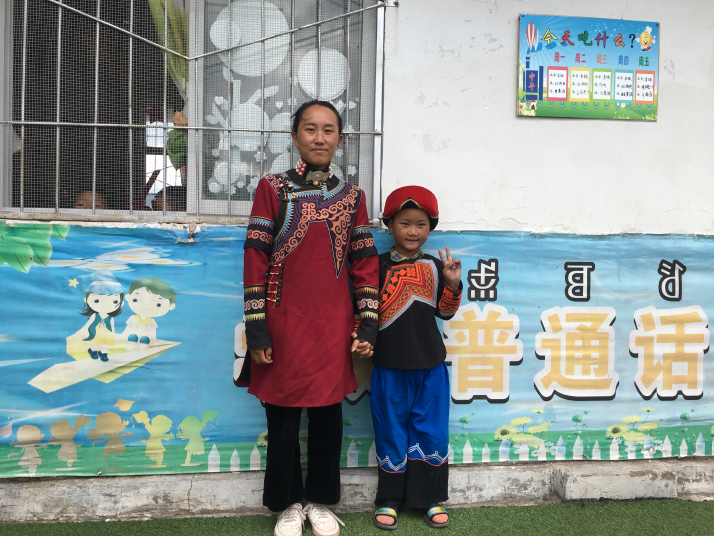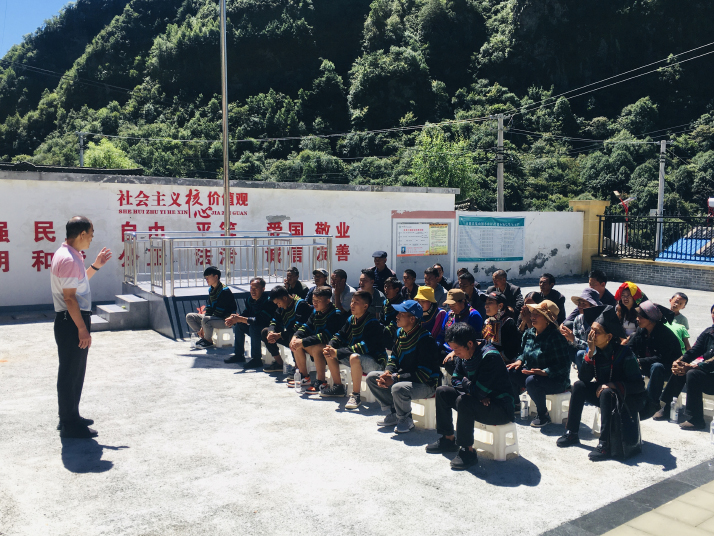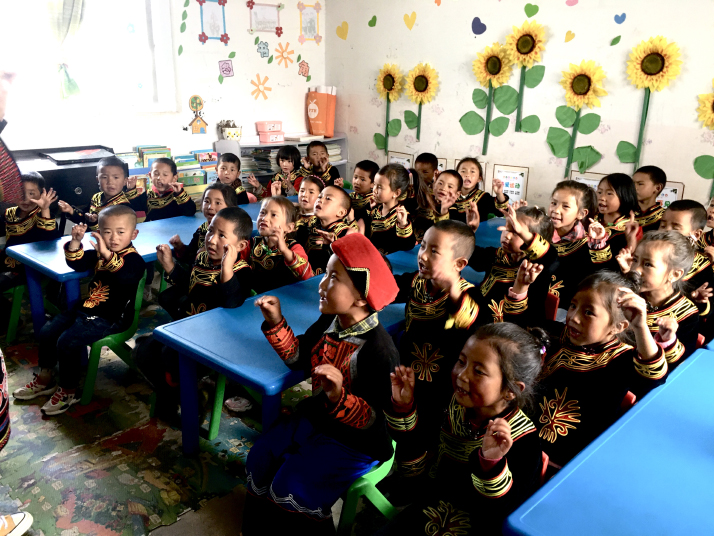| China |
| Mountain people fight poverty with education and skills training | |
|
|
 Azhi Wuji and her son Jineng Xiaofei at his kindergarten in Jiebanada Village in Liangshan Yi Autonomous Prefecture, Sichuan Province in southwest China, on August 21 (XINHUA)
Mist shrouded Jiebanada, a village at the foot of a mountain in Liangshan Yi Autonomous Prefecture, Sichuan Province in southwest China, on the early morning of August 21. Six-year-old Jineng Xiaofei got up early as usual, washed up and had breakfast. By then the sun was out and the mist had been blown away, revealing a bright blue sky. Holding his mother's hand, Jineng walked to the newly built and only kindergarten located at the center of his village.
"Clap your hands and wash them frequently for good hygiene," sang Jineng and his classmates from the Washing Hands song, to start their day at the kindergarten. Jineng's village is in Zhaojue, a county in Liangshan that is still in poverty. Due to poor transportation, a location that is cut off from the outside world and a lack of educational resources, local people have lagged behind their peers in other parts of the country. However, with the implementation of poverty alleviation plans, the prefecture, realizing the importance of improving education for poverty alleviation, has carried out a project to popularize Mandarin, the standard Chinese language, among preschool students so that they can master the necessary language skills.  Farmers attend skills training at a village in Xide, a county in Liangshan, on August 24 (XINHUA)
Improving education
The Yi people in Liangshan use the Yi language in their daily lives. Many children had not learned Mandarin before entering primary school. And even after, many are unable to speak Mandarin well, can't follow their teachers and lose interest in studying. Some even drop out of school, affecting their future. Jineng's older brother Jineng Wuha, who is in second grade, has performed poorly because he can't understand what his teachers say in class. "Before going to kindergarten, Jineng Wuha could hardly speak Mandarin. But now he has improved a lot and even teaches me to speak it at home sometimes," his mother Azhi Wuji said. Azhi said when she and her husband went to work in Guangdong Province in south China and Gansu Province in northwest China, they couldn't understand what other people said since they couldn't speak Mandarin. "It was very hard," she said. So she wanted her children to speak Mandarin well. Jineng Xiaofei's younger brother was enrolled in kindergarten in September. Azhi said she wants him to speak Mandarin as well as Jineng Xiaofei does. Lack of skill in the standard Chinese language hampered local people's efforts to make a decent living. To alleviate poverty, the prefecture has spared no effort to develop education, an important way for ending the intergenerational transmission of poverty. In May 2018, Liangshan started a pilot project to popularize Mandarin among preschool students. Under the project, 2,724 village kindergartens were established and 112,800 children started to learn Mandarin. They also offer courses in the Yi language and traditional culture to keep the ethnic culture alive. The kindergartens are within primary schools, in rented houses or transformed village committee offices. To attract more children, the prefecture provides free lunch. Huang Jing, Director of the Preschool Mandarin Learning Leading Group Office of Liangshan, said, "Many parents found that their children were making rapid progress in learning the standard Chinese language, and they became more willing to enroll their children there." "After the first batch of children graduated from the program and entered primary schools, a follow-up survey was conducted. It showed them to be more focused in class and more willing to communicate with teachers, and they generally achieved better scores," Huang said. In December 2019, the Communication University of China conducted a sample test on the linguistic capability of first grade students in Liangshan who had participated in the preschool Mandarin learning project. It found that 99.03 percent of them meet the language standard.  A kindergarten in Jiebanada Village in Liangshan on August 21 (XINHUA)
Tech-equipped farmers In addition to building kindergartens, Liangshan has also provided training to help farmers improve planting and cattle raising skills. On August 24, Adi Aqie, a 36-year-old villager, went to the night school at the center of his village by motorbike. Technicians from the agriculture and rural affairs bureau of Xide, a county in Liangshan, came to the village to give lectures that day. One of the topics was how to increase potato output, which was of great concern in Adi's village. This year, several hailstorms have killed many potato stalks and as a result, the total output may decrease sharply. Lama Wusha, an agricultural technician, offered solutions to improve the survival rate and output of potatoes. Adi's village, Xiaoshan, used to be the only impoverished one in Xide, the lack of technology and skills being the primary reason. In November 2015, Bajiu Tie'er's sow gave birth to over 10 piglets, but they all died because he lacked technologies to keep them warm in the cold weather. "Farmers can't thrive without technology," said Bajiu, who is also secretary of the village branch of the Communist Party of China. To prevent similar mishaps, the village organized farmers to watch videos on pig raising to learn how to ensure their piglets survive the winter. As these training sessions became more popular, a night school was established for villagers. "Although it's called a night school, it's not run at night only. The courses are given according to farmers' needs and in various venues such as the fields or farmers' homes," Bajiu said. "When it's sunny, people sit around the square at the center of the village to listen to the courses while basking in the sun." The night school offers courses at least once or twice a month. In early May, which is a critical period for preventing animal diseases, experts are invited to teach how to vaccinate animals. During traditional Yi festivals when migrant workers return home for celebrations, the night school offers trainings on labor arbitration and safety to improve farmers' awareness of their rights and interests. The school also provides training in electrowelding, excavator driving and cooking during the festivals according to migrant workers' needs. Lama Wusha said the biggest changes in villagers after attending night school is that they are beginning to believe in science. "In the past, villagers didn't trust vaccines, so we teach them the importance of vaccination during the training. Now all the cattle in the village get vaccinated," she said. "We also stress the importance of keeping the pens clean to reduce the chance of bacteria breeding and prevent cows and sheep from developing chronic diseases." "In the past, many cows and sheep died of illnesses every year because we didn't trust vaccines. But after taking classes at the night school, we began giving injections to the animals and now they seldom fall ill," Adi said. "Today, there are very few cows or sheep that die of illnesses, so our profit has increased. In the future, I will continue to attend night school courses so that I can learn more and become more of a modern farmer." (Reporting from Liangshan Yi Autonomous Prefecture, Sichuan Province) (Print Edition Title: Wings to Win) Copyedited by Rebeca Toledo Comments to wenqing@bjreview.com |
|
||||||||||||||||||||||||||||||
|
